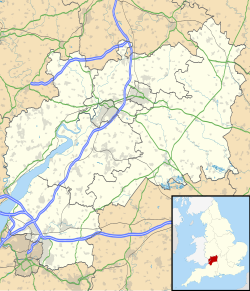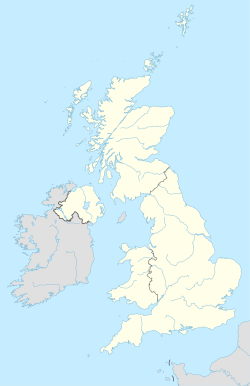RAF Northleach
| RAF Northleach | |||||||||||
|---|---|---|---|---|---|---|---|---|---|---|---|
| Northleach, Gloucestershire in England | |||||||||||
| Coordinates | 51°50′19″N 001°50′30″W / 51.83861°N 1.84167°W | ||||||||||
| Type | Royal Air Force Satellite Station | ||||||||||
| Site information | |||||||||||
| Owner | Air Ministry | ||||||||||
| Operator | Royal Air Force | ||||||||||
| Controlled by | RAF Flying Training Command | ||||||||||
| Site history | |||||||||||
| Built | 1941 | ||||||||||
| In use | 1942 - 1944 | ||||||||||
| Battles/wars | European theatre of World War II | ||||||||||
| Airfield information | |||||||||||
| |||||||||||
| Operational dates.[1] | |||||||||||
Royal Air Force Northleach or more simply RAF Northleach is a former Royal Air Force Satellite Station near the Cotswold town of Northleach, Gloucestershire. Though named after the nearby town the land the airfield occupied was located in the nearby parishes of Hampnett and Turkdean.[2]
Constructed during 1941[3] the 200-acre (0.81 km2) airfield was designated an emergency landing ground until July 1942 when it was assigned to No. 3 Glider Training School RAF from nearby RAF Stoke Orchard which provided basic elementary training for pilots of the Glider Pilot Regiment.[4]
During September 1942 the airfield was used to train soldiers of the RAF Regiment detachment from Stoke Orchard until they moved to Mythe Camp near Tewkesbury.[5] It then became a Relief Landing Ground (RLG) for RAF Stoke Orchard on 2 November 1942 with a flight of Miles Master II GT tug aircraft and General Aircraft Hotspur II gliders arriving on 16 November 1942. Flying training for men of the Glider Pilot Regiment began the very next day with the first course arriving by bus.[5]
During the winter of 1942 the flying surface of the airfield became so waterlogged that the airfield was unusable and all flying training returned to Stoke Orchard until February 1943. Flying continued at Northleach through the middle of 1943 but water-logging again became a problem resulting in an additional detachment being sent to RAF Wanborough, Wiltshire to maintain the level of training.[6]
In May 1944 RAF Northleach was re-classified in status as a full satellite airfield but the planned upgrade to add additional hangars and services was not carried out.[5]
The winter of 1944 saw Northleach and Stoke Orchard yet again suffer from water-logging which resulted in the cessation of flying at Northleach and relocation to RAF Zeals, Wiltshire on 21 October 1944. This would be the last time the airfield was used for flying.[5]
On 11 January 1945 No. 3 Glider Training School left RAF Stoke Orchard and RAF Northleach for good, relocating to RAF Exeter, Devon and its satellite of RAF Culmhead, Somerset. RAF Northleach was placed under "Care and Maintenance" thereafter until the site was de-requisitioned and wholly abandoned by the RAF in May 1946.[3]
References
[edit]- ^ "RAF Northleach". Airfields of Britain Conservation Trust. Archived from the original on 4 June 2012. Retrieved 14 May 2012.
- ^ N. M. Herbert; Carol Davidson Cragoe, A. R. J. Jurica; Elizabeth Williamson. A History of the County of Gloucester: volume 9: Bradley hundred. The Northleach area of the Cotswolds (2001), pp. 217-233. Archived from the original on 22 October 2012. Retrieved 5 October 2009.
{{cite book}}: CS1 maint: multiple names: authors list (link) - ^ a b Air Ministry. AERODROMES (Code 3): Consolidated statements on the use of RAF airfields: February–April.
- ^ "The Jet Age Museum Cockpit Project". Gloucester Transport History. Archived from the original on 2 February 2015. Retrieved 28 August 2020.
- ^ a b c d Air Ministry. No. 3 G.T.S., Stoke Orchard, later Exeter, Culmhead and Wellesbourne Mountford. Archived from the original on 28 August 2020. Retrieved 5 October 2009.
- ^ Michael JF Bowyer (2000). Action Stations Revisitied No.2 Central England and the London area (2004), pp. 279. ISBN 9780947554941. Archived from the original on 28 August 2020. Retrieved 5 November 2016.


